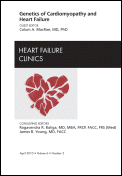
Heart Failure Clinics
Scope & Guideline
Transforming Cardiology with Evidence-Based Solutions
Introduction
Aims and Scopes
- Heart Failure Pathophysiology and Management:
Research articles delve into the underlying mechanisms of heart failure, providing insights into effective management strategies for various types, including heart failure with reduced and preserved ejection fraction. - Innovative Therapeutic Approaches:
The journal emphasizes novel treatments, including pharmacological interventions, mechanical circulatory support, and non-pharmacological approaches, highlighting their efficacy and safety in heart failure patients. - Advanced Imaging Techniques:
A significant focus is placed on the role of advanced imaging modalities, such as cardiovascular magnetic resonance and echocardiography, in diagnosing and managing heart failure. - Emerging Technologies and Digital Health:
The journal explores the integration of artificial intelligence, remote monitoring devices, and telehealth in improving heart failure care and patient outcomes. - Special Populations and Comorbidities:
Research often addresses heart failure in special populations, including patients with congenital heart disease, obesity, and cancer, as well as comorbid conditions that complicate management.
Trending and Emerging
- Role of Artificial Intelligence and Machine Learning:
There is an increasing emphasis on utilizing AI and machine learning for predictive analytics, diagnostic imaging, and personalized treatment plans, reflecting a significant trend towards technological integration in clinical practice. - Focus on Comorbidities and Multidisciplinary Care:
Emerging themes highlight the importance of addressing comorbid conditions such as obesity, diabetes, and cancer in heart failure management, fostering a comprehensive approach to patient care. - Health Disparities and Social Determinants:
Recent publications are increasingly discussing racial, ethnic, and gender disparities in heart failure care, emphasizing the need for equitable healthcare strategies. - Impact of COVID-19 on Heart Failure:
The COVID-19 pandemic has generated a surge in research exploring its direct and indirect effects on heart failure patients, including complications and altered care pathways. - Advancements in Mechanical Circulatory Support:
Innovations in mechanical devices, including left ventricular assist devices, are receiving heightened attention, reflecting ongoing advancements in treatment options for advanced heart failure.
Declining or Waning
- Traditional Pharmacotherapy Focus:
There is a noticeable decrease in publications centered on conventional heart failure medications, as newer classes of drugs and combination therapies gain attention. - Basic Science Research:
The journal has shifted its focus away from fundamental biological mechanisms of heart failure towards more clinical applications, reducing the prevalence of basic science studies in recent issues. - Single-Modal Imaging Techniques:
As multimodal and advanced imaging approaches gain traction, traditional single-modal imaging studies, such as those focusing solely on echocardiography, are becoming less frequent. - Generalized Population Studies:
Research addressing heart failure in the general population seems to be waning, with a stronger emphasis now on specific cohorts and high-risk groups.
Similar Journals

Nepalese Heart Journal
Exploring Innovations in Heart Disease ManagementNepalese Heart Journal, published by the CARDIAC SOC NEPAL, serves as a premier platform for disseminating knowledge in the field of cardiology and cardiovascular health. With an ISSN of 2091-2978, this journal aims to bridge the gap between researchers, clinicians, and academicians by presenting high-quality, peer-reviewed articles that address clinical practices, innovative research, and emerging trends in heart disease management, especially within the context of Nepal and the surrounding region. Although it operates under a traditional publishing model, its commitment to excellence aids in reinforcing the scientific discourse in an area critical to public health. The journal is a valuable resource for professionals and students alike who are focused on advancing their understanding of cardiology and its implications for health policy and practice. Exploring the intersections of local challenges and global advancements in heart health, the Nepalese Heart Journal is poised to contribute meaningfully to the evolving landscape of cardiovascular research.
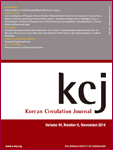
Korean Circulation Journal
Bridging Research and Practice in Cardiology.Korean Circulation Journal, published by the Korean Society of Cardiology, has established itself as a prominent platform for disseminating research in the fields of Cardiology and Cardiovascular Medicine. With an ISSN of 1738-5520 and an E-ISSN of 1738-5555, this journal has been at the forefront of cardiovascular science since its inception in 2006 and is projected to continue until 2024. The journal's commitment to quality is reflected in its 2023 category quartiles, ranking in the second quartile (Q2) for both Cardiology and Internal Medicine, as well as its commendable Scopus rankings within the respective fields. Located in South Korea, the journal aims to bridge the gap between cutting-edge research and practical applications, serving as an invaluable resource for researchers, healthcare professionals, and students keen on advancing their understanding of cardiovascular health. Although currently not an open-access journal, it provides a wealth of knowledge that encourages evidence-based practice in clinical settings.
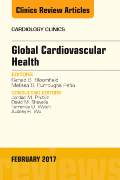
CARDIOLOGY CLINICS
Shaping the future of heart health through rigorous research.CARDIOLOGY CLINICS is a prestigious journal published by W B SAUNDERS CO-ELSEVIER INC, offering insightful and comprehensive reviews in the field of cardiology and cardiovascular medicine since its inception in 1983. With its ISSN 0733-8651 and E-ISSN 1558-2264, the journal has established a significant impact factor within the academic community, holding a Q2 ranking in both Cardiology and Cardiovascular Medicine as well as in Medicine (miscellaneous) for 2023. Located in the heart of Philadelphia, USA, it serves as a vital resource for researchers, clinicians, and students seeking to deepen their understanding of cardiovascular diseases and advancements in treatment. Although it operates under a traditional subscription model, the journal remains committed to disseminating valuable knowledge that shapes current practices and informs future research directions. As it converges towards its 2024 issues, CARDIOLOGY CLINICS continues to play an influential role in enhancing the discourse on cardiovascular health worldwide, ensuring that its audience stays at the forefront of clinical and scientific developments.

Frontiers in Cardiovascular Medicine
Pioneering Research in Cardiology and Beyond.Frontiers in Cardiovascular Medicine is a leading open-access journal published by FRONTIERS MEDIA SA, dedicated to advancing research in the field of cardiology and cardiovascular medicine. Since its inception in 2014, the journal has become a vital platform for the dissemination of high-quality research, boasting a commendable Q2 rank in the 2023 category for Cardiology and Cardiovascular Medicine. With a focus on promoting innovative studies and clinical insights, Frontiers in Cardiovascular Medicine facilitates open access to its content, allowing researchers, healthcare professionals, and students from around the globe to engage with the latest findings which are critical for the advancement of cardiovascular health. The journal's significant presence in the academic landscape, as indicated by its Scopus ranking (161/387 and 58th percentile), underscores its importance as a research outlet in this essential field. Located in Lausanne, Switzerland, the journal continues to support the global cardiovascular community by encouraging collaboration and knowledge sharing to address the challenges faced in cardiovascular medicine today.
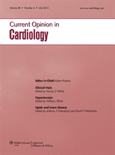
CURRENT OPINION IN CARDIOLOGY
Exploring the forefront of cardiovascular innovation.CURRENT OPINION IN CARDIOLOGY, published by LIPPINCOTT WILLIAMS & WILKINS, is an esteemed journal in the field of cardiology that has been serving the academic community since 1988. With a robust focus on the latest developments and emerging trends in cardiovascular medicine, this journal aims to bridge the gap between clinical practice and research, offering critical insights and expert commentary. The journal is recognized in the medical community, achieving a 2023 Scopus rank of #148 out of 387 in its category, placing it in the 61st percentile. Although it operates under a subscription-based model, CURRENT OPINION IN CARDIOLOGY remains an essential resource for researchers, practitioners, and students seeking cutting-edge knowledge and advancements in cardiology. As a Q2 journal in the field, it continues to foster dialogue and provide a platform for disseminating impactful cardiovascular research, ultimately contributing to improved patient outcomes and informed clinical decisions.

Current Heart Failure Reports
Delivering Essential Research for Cardiovascular CareCurrent Heart Failure Reports, published by SpringerNature, is a leading journal dedicated to advancing the field of cardiology, specifically focusing on heart failure. With an impressive impact factor and a recognized reputation, this journal falls under the top quartiles in several categories, including Q1 in Cardiology and Cardiovascular Medicine and Emergency Medicine. Its range of topics encompasses both clinical and research insights into heart failure management, offering valuable perspectives aligned with the latest therapeutic advancements. Although it does not have open access options, researchers and practitioners can find profound studies and reviews aimed at improving patient care and outcomes in cardiovascular health. As the journal converges towards its 20th year in print, it continues to serve as a critical resource for academic professionals, providing a platform for high-quality research that shapes the future of heart failure treatments.

Current Treatment Options in Cardiovascular Medicine
Navigating the future of cardiology with expert analyses.Current Treatment Options in Cardiovascular Medicine is a leading journal dedicated to advancing knowledge in the field of cardiology and cardiovascular medicine. Published by SpringerNature, this journal seeks to bridge the gap between clinical practice and research by providing comprehensive reviews, insightful analyses, and updates on the latest treatment modalities available for cardiovascular diseases. With an ISSN of 1092-8464 and an E-ISSN of 1534-3189, it displays a commitment to disseminating critical information to healthcare professionals and researchers globally. Despite its recent categorization in the Q3 quartile, the journal continues to maintain relevance with a Scopus rank of #246 in the field, reflecting its contribution to the ongoing discourse in cardiovascular care. The publication encompasses a broad spectrum of topics, from interventional cardiology to pharmacotherapy, supporting the journal's objective to enhance patient care through evidence-based treatment options. Researchers, professionals, and students will find Current Treatment Options in Cardiovascular Medicine an indispensable resource for staying at the forefront of cardiovascular innovations and applications.
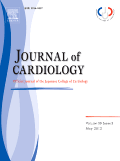
Journal of Cardiology
Driving breakthroughs in heart health and patient care.Journal of Cardiology, published by ELSEVIER, stands as a prominent resource in the field of cardiology and cardiovascular medicine. With a rich history since its inception in 1987, this peer-reviewed journal aims to disseminate cutting-edge research that enhances the understanding and treatment of cardiovascular diseases. Its 2023 ranking places it in the Q2 category within its discipline, reflecting its significance and impact, as evidenced by a Scopus rank of #123 out of 387 journals, positioning it in the 68th percentile of its field. The journal is headquartered in Japan, providing a unique perspective on cardiological advances relevant not only to the Asian continent but also globally. Though it does not currently offer open access, the Journal of Cardiology remains a vital institutional resource for researchers, clinicians, and students seeking to push the boundaries of cardiovascular science and improve patient outcomes.
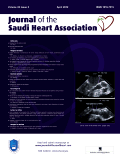
Journal of the Saudi Heart Association
Empowering Heart Health Through Research and CollaborationThe Journal of the Saudi Heart Association is a prominent scholarly publication dedicated to advancing knowledge in the fields of cardiology and cardiovascular medicine. Published by DIGITAL COMMONS BEPRESS, this open-access journal has been serving the global community since 2009, providing a vital platform for researchers, practitioners, and students interested in the latest developments in heart health and disease management. With an ISSN of 1016-7315 and a growing repository of knowledge alongside an E-ISSN of 2212-5043, the journal showcases an array of peer-reviewed articles that contribute to the understanding of cardiovascular conditions. Although categorized in the Q4 quartile for 2023, it remains committed to offering valuable insights, particularly within the constraints of the 29th percentile rank specified by Scopus. As the journal converges towards 2024, it continues to foster collaboration, innovation, and inquiry within the Saudi Arabian and international medical communities.
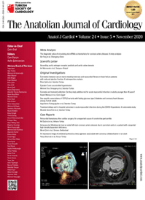
Anatolian Journal of Cardiology
Empowering Cardiovascular Insights, One Article at a Time.The Anatolian Journal of Cardiology, published by KARE PUBL, stands as a vital resource in the field of Cardiology and Cardiovascular Medicine. With an ISSN of 2149-2263 and E-ISSN 2149-2271, this Open Access journal has been fostering the dissemination of critical research since 2001, ensuring that high-quality content is freely available to a global audience. Based in Turkey, the journal aims to bridge gaps in cardiological knowledge through rigorous peer-reviewed articles that span a wide range of topics, from innovative clinical practices to groundbreaking research findings. While its current ranking places it in the Q3 category of cardiology journals, the Anatolian Journal of Cardiology continues to strive towards enhancing its impact, currently holding a Scopus rank of 236 out of 387. Researchers, practitioners, and students alike will find this journal an essential platform for keeping abreast of the latest developments in cardiovascular health.